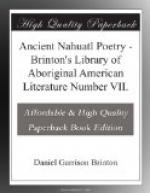To take the place of the older melodies, the natives were taught the use of the musical instruments introduced by the Spaniards, and very soon acquired no little proficiency, so that they could perform upon them, compose original pieces, and manufacture most of the instruments themselves.[6]
To this day the old love of the song and dance continues in the Indian villages; and though the themes are changed, the forms remain with little alteration. Travelers describe the movements as slow, and consisting more in bending and swaying the body than in motions of the feet; while the songs chanted either refer to some saint or biblical character, or are erotic and pave the way to orgies.[7]
Sec. 2. THE POET AND HIS WORK.
The Nahuatl word for a song or poem is cuicatl. It is derived from the verb cuica, to sing, a term probably imitative or onomatopoietic in origin, as it is also a general expression for the twittering of birds. The singer was called cuicani, and is distinguished from the composer of the song, the poet, to whom was applied the term cuicapicqui, in which compound the last member, picqui, corresponds strictly to the Greek poiaetaes, being a derivative of piqui, to make, to create.[8] Sometimes he was also called cuicatlamantini, “skilled in song.”
It is evident from these words, all of which belong to the ancient language, that the distinction between the one who composed the poems and those who sang them was well established, and that the Nahuatl poetry was, therefore, something much above mere improvisation, as some have thought. This does not alter the fact that a professed bard usually sang songs of his own composition, as well as those obtained from other sources. This is obvious from the songs in this collection, many of which contain the expression ni cuicani, I, the singer, which also refers to the maker of the song.
In the classical work of Sahagun, the author describes the ancient poet: “The worthy singer has a clear mind and a strong memory. He composes songs himself and learns those of others, and is always ready to impart either to the fellows of his craft. He sings with a well-trained voice, and is careful to practice in private before he appears before the public. The unworthy singer, on the other hand, is ignorant and indolent. What he learns he will not communicate to others. His voice is hoarse and untrained, and he is at once envious and boastful."[9]
Sec. 3. THE THEMES AND CLASSES OF THE SONGS.
From what he could learn about them some two centuries or more after the Conquest, the antiquary Boturini classified all the ancient songs under two general heads, the one treating mainly of historical themes, while the other was devoted to purely fictitious, emotional or imaginative subjects.[10] His terse classification is expanded by the Abbe Clavigero, who states that the themes of the ancient poets were various, some chanting the praises of the gods or petitioning them for favors, others recalled the history of former generations, others were didactic and inculcated correct habits of life, while others, finally, were in lighter vein, treating of hunting, games and love.[11]




